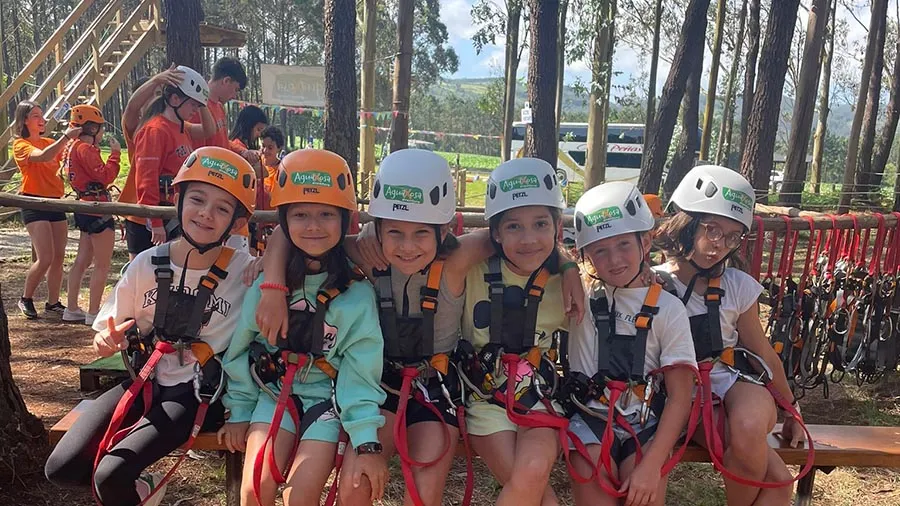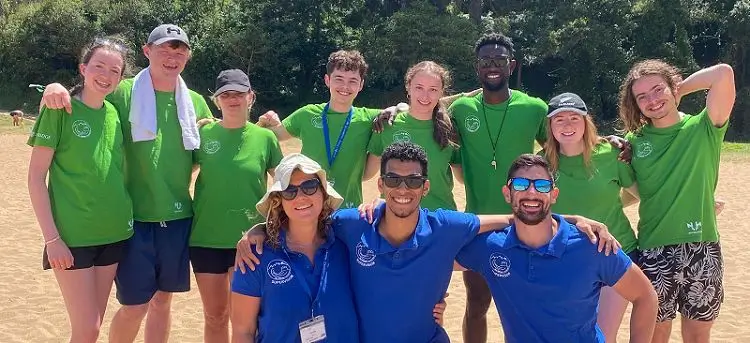Summer arrives, and with it the big question many parents ask:
Which English camp will be the most suitable for my child?
The offer is enormous: urban programs, international ones, with native monitors, sports, artistic, one or two weeks… However, beyond the activities or the price, age is the factor that most influences the experience and the learning.
A 9-year-old child does not experience a camp in the same way a 15-year-old teenager does. Their needs, their level of autonomy and their way of learning are completely different. For this reason, choosing well does not mean looking for the “most complete” camp, but the one that best adapts to your child's life stage and personality.
That’s why age-specific programmes make such a difference. Younger children thrive in environments designed for their pace and emotional needs, such as an international English immersion summer camp in Spain for children aged 8–12, while teenagers need more independence, real challenges and social interaction, which is exactly what an a real English immersion summer camp in Spain for teenagers aged 13–17 provides.
In this guide you will discover:
- What an English camp should offer according to age (Kids 8–12 and Teens 13–17).
- How to know if a program offers real immersion and not just English classes.
- Which questions to ask before booking and what signs indicate that your child will be in good hands.
The goal is not only to learn English: it is that each child enjoys a summer that helps them grow, gain confidence and discover that the language can be a natural part of their life.
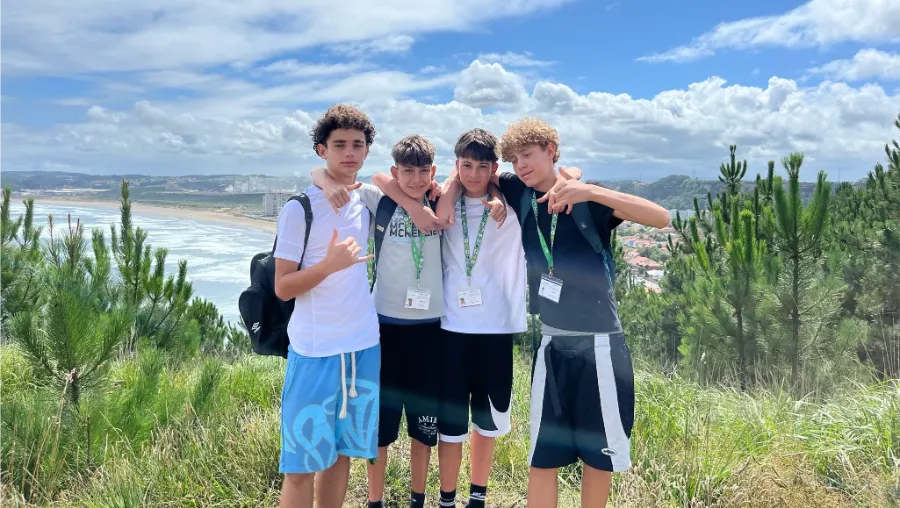
Why age matters when choosing an English camp
Many parents look for an “English camp”, but few stop to think that not all children learn in the same way. Age creates a huge difference in how the experience is lived, in how they relate to others and, above all, in how they assimilate the language.
A perfect program for a 9-year-old may be too demanding for an 11-year-old, and one designed for teenagers could bore an 8–10-year-old group. That is why the first step to getting it right is not to look at the price or the campus photos, but to understand what your child needs at this moment in their development.
Different developmental stages and needs
Between ages 8 and 17 there is a profound transformation: cognitive, emotional and social.
- Children (8–12 years old) learn through play, imitation and emotion. They need structure, trust and close support.
- Teenagers (13–17 years old) seek independence, identity and connection with their peers. They are motivated by challenge, cooperation and feeling like protagonists.
If the camp ignores that difference, English becomes a chore. If it respects it, learning occurs effortlessly, naturally and lastingly.
How the way of learning English changes with age
In childhood, the brain assimilates languages with astonishing ease: it does so through exposure, rhythm and repetition. The more the language is lived, the deeper it sticks.
In adolescence, learning is no longer automatic, but it gains depth: young people understand structures, irony, nuances and cultural contexts.
That is why an effective camp does not use the same approach for everyone.
- The youngest need guided games, songs, stories and workshops.
- Older participants need debates, projects, sports and experiences where English has practical meaning.
The secret is to adapt the methodology and daily life to the cognitive moment.
Risks of not adapting the experience to the age
Choosing a “generic” camp may seem convenient, but it often creates frustration:
- The youngest may feel lost or insecure.
- Teenagers may feel bored or infantilized.
- In both cases, the most important thing is lost: motivation.
When the environment is not designed for their stage, children speak less English and participate with less energy. On the other hand, when the program challenges them just enough, the language stops being an effort and becomes part of the game or the challenge.
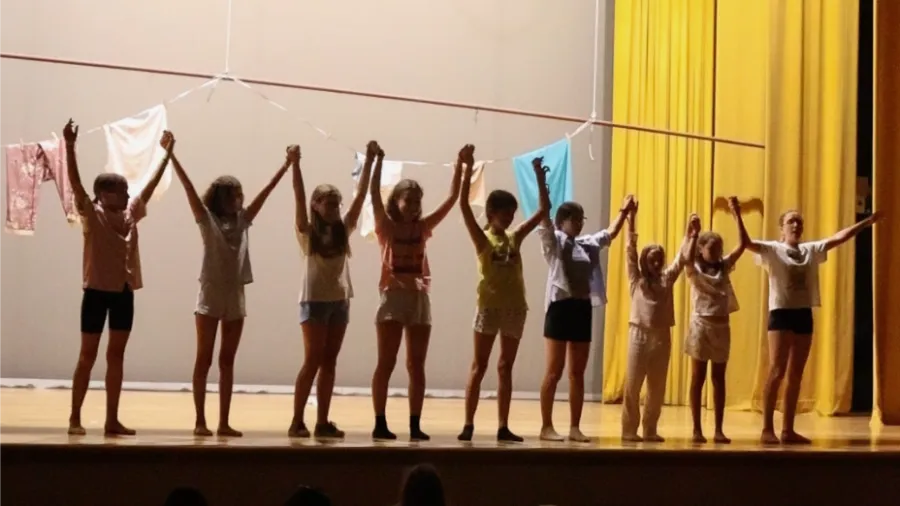
What an English camp for children (Kids 8–12 years old) should include
Between ages 8 and 12, children live in a magical point of balance: they already have enough autonomy to explore the world, but still need the presence and guidance of adults.
That is why the best English camp for them is not the most academic or the most demanding, but the one that combines play, learning and human support.
A well-designed camp for this age should make children feel at home, even if they are far from it, and ensure that English is part of everything they do: from waking up in the morning to laughing during a scavenger hunt or telling a story at the end of the day.
An environment where English is lived, not studied
At this age, children do not learn English by repeating phrases, but by living the language in action.
The monitor’s instructions, a joke at breakfast or a song during a workshop are worth more than an hour of grammar.
English must be the language of daily life, not only of classes.
A good camp gets children to think, play and communicate in English without realizing it.
That is the difference between a “bilingual” program and a truly immersive experience.
The key: turning English into a natural part of the fun, not a school subject.
Activities that spark curiosity and confidence
For younger children, motivation is born from emotion.
Activities must be varied, participatory and adapted to their level of energy: sports, creative workshops, scavenger hunts, theater, cooking, music or cooperative challenges.
Every game has a purpose: improving comprehension, expanding vocabulary and fostering confidence to speak.
When children laugh, move, and create, they lose their fear of making mistakes — and that is the real gateway to learning.
In the Village, the Kids programs include:
- Activities in small groups led by international coaches.
- Workshops such as Broadway Junior, Mini Media Lab or Cooking Fun.
- Sports and outdoor dynamics adapted to their age.
- Calm moments (reading, mindfulness, crafts) to balance the day.
Close support: feeling safe to fully enjoy
At ages 8 or 9, many children experience their first summer away from home. Human support is as important as language instruction.
That is why a good camp must offer:
- Small ratios that allow constant attention.
- Monitors trained in early childhood education and first aid.
- Fluent communication with families, so parents feel reassured.
- Stable routines: children know who wakes them up, who they eat with and who to turn to if they need something.
Learning only flourishes when there is emotional safety.
And that safety is given by human care: children will not remember the vocabulary list, but they will remember their monitor’s smile.
Safety, wellbeing and essential care
Parents do not only look for English; they look for peace of mind.
Therefore, a good camp for this age must ensure:
- Closed and secure facilities with areas separated by age.
- 24-hour infirmary and clear protocols for any incident.
- Healthy menus designed by nutritionists, with options for allergies or intolerances.
- Continuous supervision, especially during water or adventure activities.
- Accident, assistance and liability insurance.
At the Village, children stay in a 4★ hotel with double rooms and private bathrooms, within a natural setting in Asturias.
The 52,000 m² sports campus allows for a combination of sports, nature and leisure without leaving a controlled environment.
Common mistakes when choosing a camp for younger children
Many programs present themselves as “English camps”, but not all deliver what they promise.
These are warning signs to avoid:
- Camps where English is only used in classes, but daily life is in Spanish.
- Teams without native or international monitors.
- Groups that are too large (more than 10 children per monitor).
- Few creative activities or too many theoretical hours.
- Lack of communication with families during the stay.
The real success does not lie in repeating English phrases, but in children wanting to continue using the language when they return home.
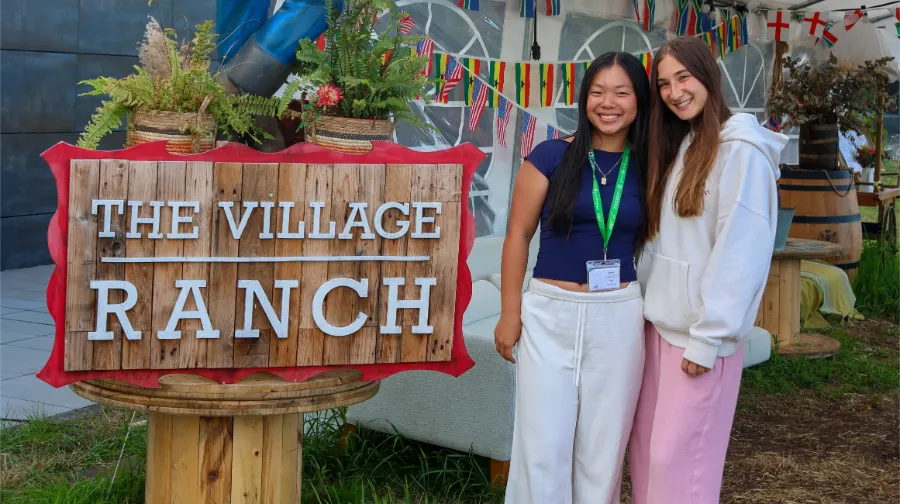
What an English camp for teenagers (Teens 13–17 years old) should include
Adolescence is a stage of first times: the first trip with friends, the first independent decisions, the first feeling of freedom. That is why an English camp well designed for this age is not just a summer course, but an opportunity for personal and linguistic growth.
Young people aged 13 to 17 learn best when they feel part of something real. They need challenges, responsibility and the feeling that you trust them. English is no longer taught: it is lived in action, through laughter, projects, sports and conversations that arise naturally.
A good program for teenagers must balance three pillars:
total immersion in the language, activities that truly motivate them, and a safe environment where they can be themselves.
Total immersion with real purpose
Unlike younger children, teenagers need to understand the reason for things. It is not enough to say “we speak English here”: they want the language to have meaning.
That is why the best English camps for this age turn the language into a constant communication tool:
- Sports and activities led by international coaches.
- Collaborative projects where English is the working language.
- Social moments —from meals to evening activities— where natural conversation is encouraged.
The result is more than 200 hours of linguistic exposure in 15 days, with real fluency and confidence when speaking.
English stops being an academic goal and becomes a life skill.
Activities that challenge and motivate
At this age, motivation comes from challenge and the excitement of what feels authentic.
An English camp for teenagers must offer experiences that match their interests and push them to surpass themselves.
At the Village, activities are designed for that purpose:
- High-level sports, such as football with UEFA/FIFA coaches, tennis, surf, sailing or padel.
- Creative academies where English merges with talent: Broadway Academy (musical theatre), Media Academy (audiovisual production) or Cooking Studio.
- Excursions and cultural experiences around Asturias, combining sea, mountains and international coexistence.
Every experience is designed to help teenagers discover new skills while using English naturally, spontaneously and in a fun way.
International coexistence and openness to the world
Adolescence is the perfect moment to broaden horizons.
Living with young people from other cultures transforms the way they see the world and strengthens their self-esteem.
Suddenly, English stops being a foreign language and becomes the key to making friends, sharing ideas and feeling part of a global community.
At the Village, teenagers live alongside young people from more than 12 nationalities and 36 Spanish provinces, creating a truly multicultural communication environment.
80% of the coaches are international, ensuring diversity of accents and cultural contexts.
Every conversation, match or workshop becomes a lesson in language and in life.
Balance between freedom and safety
Parents want their children to grow, but without risks. And teenagers need independence, but within a framework of trust.
A good camp for this age knows how to find that balance.
It must offer:
- Constant supervision with progressive freedom.
- Small ratios (1 monitor for every 5 participants).
- Programs adapted to age and maturity.
- Emotional support: monitors trained not only to direct, but to listen and guide.
- Fluent communication with families, without losing the teenagers’ sense of autonomy.
At the Village, this structure is designed so that teenagers feel free, but always supported.
They can choose activities, lead groups or propose projects, knowing that a professional and caring team is behind them.
What teenagers gain beyond English
Beyond the language, what a teenager takes home from a camp like the Village is a set of vital learnings:
- Confidence to express themselves and make decisions.
- Autonomy and personal responsibility.
- Social and intercultural skills.
- Memories and international friendships that last for years.
Learning English is just the beginning.
The real transformation happens when they discover that they can rely on themselves, communicate with the world and feel capable of anything.
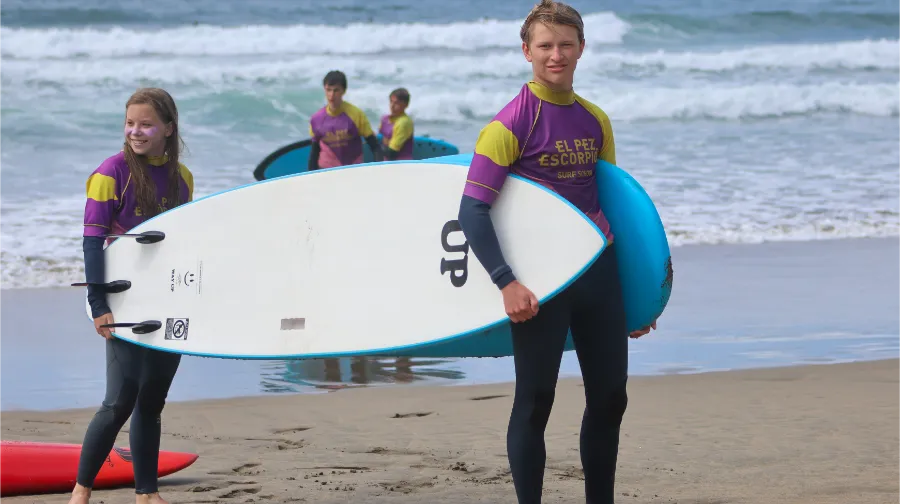
How to compare options and choose the right camp according to age
Choosing the ideal camp is not a matter of luck. Each program has its own approach, and what can be perfect for a 9-year-old may be boring or limited for a 15-year-old. That is why comparing with criteria is the best way to ensure a positive experience and real learning.
Before booking, take a few minutes to review these key points.
They will make all the difference between an acceptable camp… and an unforgettable summer.
1. Make sure the program is adapted by age
It seems obvious, but it is not always the case.
An English camp must have differentiated programs for each age group:
- Kids (8–12 years) → playful approach, close support and learning through play.
- Teens (13–17 years) → challenging activities, autonomy and international coexistence.
If the organization does not specify clear differences or mixes very different ages in the same activities, it is probably not truly adapted.
2. Review the type of English immersion
Not all “English camps” offer real immersion.
Ask these questions before deciding:
- Is English used only in classes or throughout the entire day?
- Are the monitors native or international?
- What percentage of time is real English used in daily life?
A good camp should guarantee at least 10–15 hours a day of exposure to the language, not just theoretical lessons. At the Village, for example, participants experience more than 200 hours of English in 15 days, through sports, workshops and daily life.
3. Analyze the quality of the human team
The team of monitors and coaches is the heart of the camp.
Make sure that:
- They are trained in pedagogy, languages or child/youth education.
- There are international or native coaches.
- A low ratio is maintained (1 monitor per 5–8 children maximum).
- They have undergone selection and training processes beforehand.
Trust is not gained with brochures, but with people.
Ask who will accompany your child and how the team is organized.
4. Evaluate the facilities and environment
Comfort and safety are the foundation of wellbeing.
Before booking, check:
- Where children will sleep (rooms, bathrooms, supervision).
- Whether there is 24h infirmary and included insurance.
- What type of campus or natural environment is provided.
- How meals and allergies are managed.
A well-organized and well-maintained environment greatly improves parents' peace of mind and children’s experience.
At the Village, participants stay in a 4★ hotel with private bathrooms, inside a 52,000 m² sports campus with pools, courts, theater and permanent infirmary.
5. Ensure there is fluent communication with families
Parents’ peace of mind depends as much on safety as on communication.
A good camp keeps families informed at all times, with clear channels:
- 24h emergency phone.
- Direct contact with coordination.
- Regular updates with photos or reports.
Transparency builds trust and shows professionalism.
6. Look for balance between learning, fun and rest
Too many classes or back-to-back activities can exhaust children.
A well-structured program alternates:
- Hours of active English.
- Sports or creative activities.
- Relaxation moments and free time.
That balance keeps motivation high and allows learning to flow naturally.
7. Check where participants come from
An international camp or one with kids from different regions enriches the experience.
The mix of accents, cultures and viewpoints forces communication in English and broadens world perspective.
If all children come from the same school or area, real immersion usually decreases.
8. Review medical coverage and insurance
A detail often overlooked:
Every serious camp must include medical insurance, accident insurance and liability insurance.
Additionally, it must have medical staff available 24 hours a day and clear protocols for medication or emergencies.
9. Observe how the camp presents itself
The way a camp communicates says a lot about its quality.
Good projects:
- Are transparent (team presentation, real photos, accreditations).
- Explain their methodology in detail.
- Have verifiable reviews and testimonials.
- Avoid vague promises like “English all day” without explaining how.
When an organization takes care of details in its presentation, it usually takes care of details in the experience.
Quick checklist for deciding
✅ Program adapted by age
✅ Real immersion (English in all activities)
✅ Qualified monitors and low ratio
✅ Safe and comfortable facilities
✅ Infirmary and insurance included
✅ Communication with families
✅ Varied and balanced activities
✅ Multicultural environment
✅ Transparency in information
✅ Your child’s excitement about going
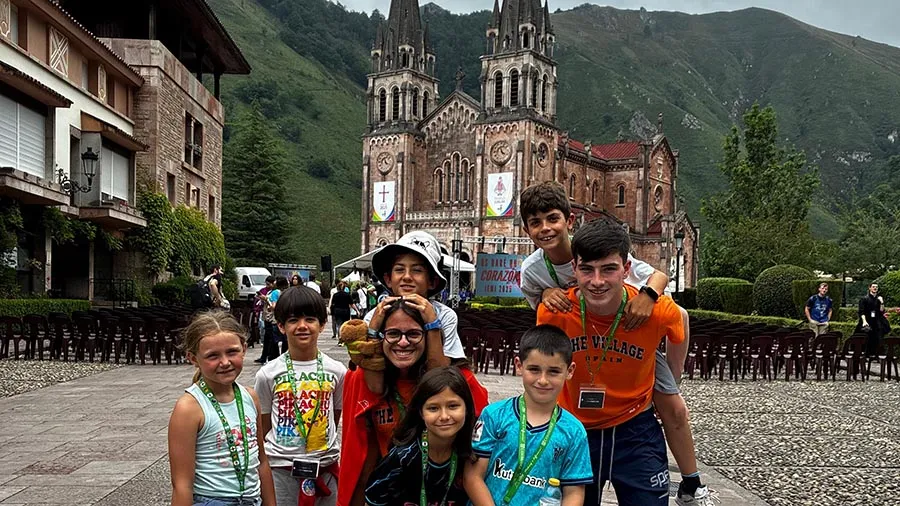
How to prepare your child to make the most of the camp
The success of a camp does not begin when the child arrives, but weeks earlier, at home.
The way they prepare directly influences how they adapt, enjoy and learn.
Parents play a decisive role: simple emotional preparation can turn the experience into something exciting rather than intimidating.
1. Talk about the camp with excitement (not worry)
Children feel what their parents transmit.
If they perceive fear or doubt, they associate the camp with insecurity; if they sense enthusiasm, they see it as an adventure.
It is best to talk about the program positively:
- “You’re going to make new friends”
- “Imagine speaking English with kids from other countries!”
- “You’re going to love the pool and the creative workshops”
Avoid phrases like “if you don’t like it, call me and I'll come get you.”
They convey distrust and reinforce separation anxiety.
The key is to show confidence and joyful expectation.
2. Involve them in the preparation
Packing together is much more than a logistical task:
it is an opportunity to talk about the trip, give autonomy and generate excitement.
Let them choose part of their clothing or a personal object that gives them security (a book, a photo, a bracelet).
At the Village, children stay in double rooms with space to organize their things, helping them feel more comfortable and responsible.
3. Reinforce autonomy before departure
The days before camp are ideal for practicing small routines:
- Dressing and grooming themselves.
- Preparing their backpack or checking their materials.
- Expressing needs (“I’m hungry”, “I need help”).
The more confident they feel in their habits, the easier adaptation will be.
The goal is not that they know how to do everything, but that they feel comfortable asking for help.
4. Introduce English naturally at home
A 100% English environment can feel overwhelming at first.
To reduce that impact, it helps greatly if the child is familiar with the language beforehand:
- Watching movies or series in original version.
- Listening to songs and talking about them.
- Playing guessing games with English words or phrases.
- Using small everyday expressions (“Good morning!”, “Thank you!”).
This will give them confidence when they arrive and realize they “know more than they thought.”
5. Explain what the daily routine will be like
Fear of the unknown is one of the most common fears in children.
Talking about the routine—wake-up time, meals, activities, rest—provides reassurance.
Explain that:
- They will sleep in a shared room (with their group and monitors nearby).
- There will be games, sports, workshops and rest times.
- There will always be someone to turn to if they need anything.
At the Village, the daily structure combines sports, creative activities, social moments and rest, always with coaches present.
6. Say goodbye with confidence, not nostalgia
The moment of goodbye can be emotional, but it is important that the child feels confident, not sad.
A firm hug, a smile and a phrase like:
“You’re going to live an incredible adventure. I’m proud of you.”
That feeling of pride and support will be what they carry with them during their first night away from home.
7. Trust the team and avoid constant calls
Adaptation needs space.
Calling or messaging every day can reinforce dependency and hinder the process.
Trust the monitors: if something important happens, they will inform you.
Meanwhile, enjoy the experience as your child does: calmly.
At the Village, the family care team maintains direct communication and regular updates, always prioritizing children's emotional wellbeing.
8. Reinforce the experience when they return home
When they return, listen to them, celebrate their achievements and avoid judging anything that didn’t go perfectly.
Ask what they learned, who they met, what made them laugh.
This emotional reinforcement closes the learning cycle and turns the experience into a positive memory they will want to repeat.
What benefits a well-chosen camp provides: language, development and confidence
When an English camp is well designed, the results go far beyond the language.
Children and teenagers do not only return with more vocabulary, but with a different way of relating to the world.
They learn without realizing it, grow effortlessly and come back home more confident, open and happy.
1. Learning English naturally and in a lasting way
In a real immersion environment, English stops being a school subject and becomes a living tool.
Children do not memorize rules: they think and communicate in English to play, collaborate, ask, tell or share.
- They improve listening comprehension thanks to continuous exposure to real accents.
- They develop oral fluency by using the language without fear.
- They expand functional vocabulary —the kind used in everyday life.
- They reinforce their internal motivation: they discover that English helps them connect with the world.
Most importantly: this kind of learning is not forgotten, because it is associated with positive emotions and real experiences.
2. Personal and emotional development
A good camp teaches as much outside the classroom as inside it.
For several days, children learn to rely on themselves, to trust their own abilities and to live with others.
They learn to:
- Organize their time and belongings.
- Ask for help when they need it.
- Solve small conflicts with empathy.
- Celebrate their own achievements and those of others.
These are skills not taught in books, but they build character, responsibility and resilience.
3. Confidence and self-esteem through daily success
Every small victory —daring to speak in English, taking part in a play, scoring a goal, making a new friend— strengthens their self-confidence.
That feeling of “I can do it” is one of the greatest gifts of camp.
When they return home, parents notice the change:
children express themselves more easily, take initiative and see English with a new attitude.
The language stops being an obstacle and becomes a way to show what they are capable of.
4. International friendships and cultural openness
Living with young people from different backgrounds is one of the most enriching experiences a child or teenager can have.
It not only improves their English: it widens their worldview, strengthens empathy and teaches them to communicate beyond words.
They discover that diversity does not divide —it unites.
And they learn that English is not an end, but a bridge to meet new people and cultures.
At the Village, every summer children and teenagers from more than 12 nationalities and 36 Spanish provinces live together, sharing laughter, sports and projects in a truly global environment.
5. Memories that become learning
Camp memories become emotional milestones.
Every excursion, song or late-night conversation leaves a mark.
And those emotions act as “anchors” for learning: every word learned is tied to a happy memory, which multiplies retention and the desire to keep learning.
English is no longer studied: it is remembered with a smile.
6. Peace of mind and satisfaction for families
When parents choose well, they also win.
They enjoy the peace of knowing their children are safe, supported and truly learning.
This mutual trust —between families, monitors and organizers— makes the experience complete: learning for the children, peace of mind for the parents.
At the Village, constant communication and personalized attention make parents feel part of the experience, even from a distance.
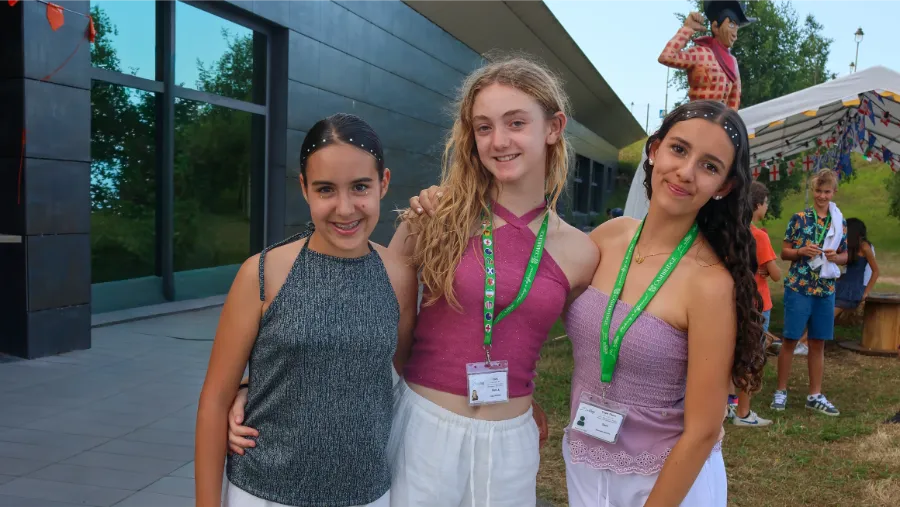
How to know if an English camp is high quality
On the internet, all camps seem to promise the same: “English all day”, “innovative methodology”, “international team”.
But behind the nice words, there are not always real guarantees.
That is why, before trusting a brand, it is important to know which signs show that a camp is truly high quality.
It is not about the brochure aesthetics or Instagram photos, but about verifiable facts: accreditations, staff, safety and educational methodology.
1. Look for recognized educational accreditations and supervision
External certifications are the first indicator of seriousness.
A camp supervised by recognized institutions shows that its program has been evaluated by experts.
For example:
- Cambridge University Press & Assessment endorses the Village’s methodology, ensuring that English learning is based on proven pedagogical principles.
- Other entities, such as Trinity College London or the British Council, can also certify quality immersion programs.
If the camp does not mention any educational reference or linguistic certification, ask for proof before booking.
2. Check the training and background of the team
The team of monitors and coaches makes the difference between an improvised experience and a truly educational one.
A high-quality camp:
- Has teachers, educators or monitors trained in teaching or pedagogy.
- Includes native or international staff to ensure real accents and varied linguistic exposure.
- Maintains low ratios (ideally 1 monitor per 5–7 children).
- Supervises the entire process with an academic or pedagogical coordinator.
Asking who will accompany your child is one of the best ways to know if the camp prioritizes learning or just entertainment.
3. Check transparency of information
A serious camp communicates clearly:
- Number of daily hours of English.
- Origin and training of the team.
- Type of accommodation and meal plan.
- Safety protocols and medical care.
- Dates, insurance and cancellation policies.
Be wary of websites that stick to generic phrases or avoid detailing the program.
Clarity is always a sign of reliability.
4. Evaluate the facilities and environment
A safe, clean and well-maintained setting not only reassures parents but improves children’s experience.
Ask to see real images of the campus, rooms, dining halls and activity areas.
The best camps offer:
- Comfortable accommodations (spacious rooms, private or supervised shared bathrooms).
- Enclosed and supervised campuses.
- Safe sports spaces and natural areas.
- Immediate medical access.
At the Village, participants stay in a 4★ hotel with private bathrooms, enjoy a 52,000 m² sports campus and have 24h infirmary and full insurance —a level of safety and comfort that is hard to match.
5. Confirm medical coverage and insurance
Every high-quality camp must include:
- Accident and liability insurance.
- 24-hour infirmary service.
- Clear medical protocols.
- Immediate communication with families for any incident.
If a program cannot provide this information in writing, it is better to look for another option.
Safety is non-negotiable.
6. Observe organization and communication with families
A good experience does not end when you drop your child off at the bus.
The best camps maintain fluent communication with families:
- Regular reports or updates.
- Direct contact channels (coordination, emergencies, management).
- Transparent arrival and departure protocols.
This communication demonstrates professionalism and builds trust from day one.
7. Value the stability and reputation of the organization
Long trajectories, verified reviews and testimonials from former participants are signs that a camp delivers on its promises.
Look for real opinions, not only those shown on their website.
Social media and Google Reviews offer an honest view of family satisfaction levels.
At the Village, hundreds of families return year after year, reflecting the program’s consistent quality and the trust built over time.
8. Compare promises with concrete data
The best way to detect quality is to contrast marketing with real figures:
- “English all day” → how many real hours of exposure?
- “Native monitors” → what exact percentage?
- “International environment” → how many nationalities?
At the Village, these figures are clear: more than 200 hours of English in 15 days, 80% international coaches and coexistence with young people from 12 nationalities.
Objective data that confirm real immersion.
How to make the most of the experience after the camp
When camp ends and children return home full of stories, laughter and new words, it’s time to keep that momentum alive.
The immersion of two or three weeks can become the starting point for a lasting change in their relationship with English—if parents know how to support it.
1. Reinforce what they lived through conversations and curiosity
The best way to keep English active is not through exercises, but by continuing to talk about the experience.
Ask your child:
- What new words they learned.
- How they communicated with their international friends.
- Which activities in English they enjoyed the most.
When they relive memories in that language, learning is reinforced emotionally.
You can even use small English phrases at home, bringing back expressions they used at camp.
For example: if they used to say “Let’s go!” before an activity, keep it as a family code.
2. Connect English with their real interests
If English is associated only with school, it becomes a duty again.
But if it’s linked to what they love—music, videogames, sports, movies, fashion—it stays alive naturally.
Some ideas:
- Watch their favorite series in original version with subtitles.
- Listen to songs or podcasts and discuss the lyrics.
- Find educational YouTube or TikTok channels in English.
- Do recipes or crafts following English instructions.
The goal is that English continues being a tool for enjoyment, not just a subject.
3. Keep in touch with camp friends
International friendships—or friendships with kids from other regions—are a treasure for maintaining real practice.
Encourage them to talk through messages, video calls or social media, always in English.
This social bond motivates more than any formal lesson: the desire to keep connecting with their friends.
At the Village, many participants remain in touch for months, sharing projects or memories in English, which reinforces long-term learning.
4. Integrate small English routines at home
There’s no need to turn your home into a language academy.
Small daily habits keep the language active:
- Having an “English Day” once a week.
- Using simple commands in English (“Pass me the salt”, “It’s dinner time!”).
- Playing board games or card games in English.
- Labeling everyday objects in English (door, fridge, window…).
These micro-exposures strengthen listening skills and normalize the language naturally.
5. Reinforce confidence, not correction
When a child makes mistakes while speaking, avoid interrupting or correcting every phrase.
The important thing isn’t perfect grammar—it’s maintaining fluency and confidence.
Celebrate the fact that they dare to speak English outside school.
Fear of mistakes is the biggest enemy of continuity.
6. Look for continuity in future programs or experiences
Camps are an initial spark, but learning consolidates with yearly repetition or continued exposure.
Consider options such as:
- Returning to the same camp the following summer.
- Joining school exchanges or language trips.
- Attending conversation clubs or academies.
Children who repeat immersion experiences usually double their fluency and confidence between the first and second year.
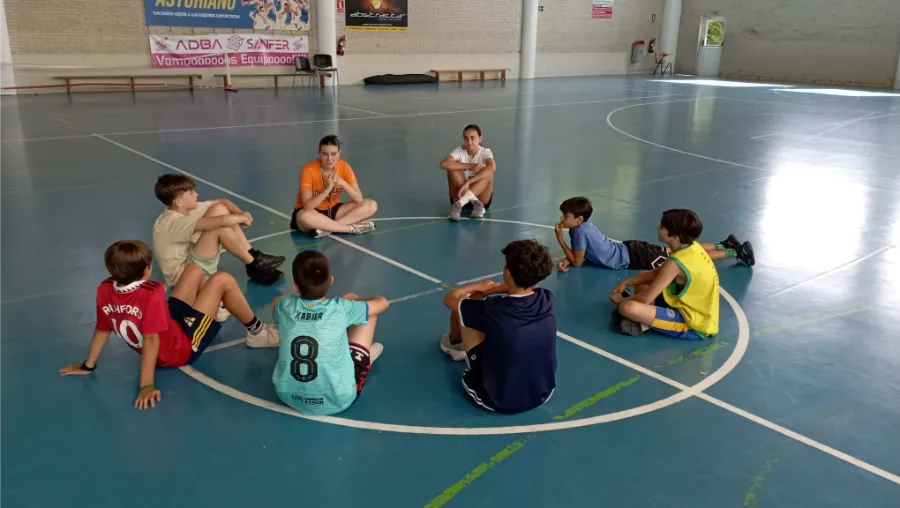
Camps in Spain vs. abroad: advantages and disadvantages
Every summer, many families wonder whether their children need to travel abroad in order to “really” learn English.
Going to Ireland or England may seem like the most effective option, but the reality is more nuanced: real immersion depends more on the environment and program than on the country itself.
A well-designed camp in Spain can offer the same international experience, with the added advantage of safety and proximity.
Let’s take a look at the key differences.
Camps abroad: the traditional option
For years, sending children abroad was synonymous with “intensive learning”.
However, that experience depends greatly on the program, the group and the participant’s age.
Advantages:
- Direct contact with an English-speaking country.
- Exposure to new cultures and accents.
- Sense of independence and adventure.
Disadvantages:
- Higher cost (flights, insurance, fees, currency exchange).
- Distance in case of an emergency.
- More difficult for younger children on their first time away from home.
- Risk of living mostly with Spanish-speaking peers, reducing real immersion.
In summary, not every program abroad guarantees real immersion—especially if the group travels with many Spanish-speaking students.
International camps in Spain: the smart alternative
Today there are programs designed to replicate an international experience without leaving the country.
The key lies in bringing together participants from different nationalities, international monitors and a 100% English environment.
Advantages:
- Same level of linguistic exposure (more than 200 hours of English in 15 days).
- 80% international coaches and coexistence with young people from 12 nationalities.
- Safe, accessible environment for families.
- More affordable cost and simpler logistics.
- 24h medical supervision and direct communication with parents.
The result is authentic immersion, with the peace of mind of knowing your children are only a few hours from home.
The international experience without leaving Spain
At the Village, every summer children and teenagers from more than 12 nationalities live together alongside 80% international coaches.
The entire program—sports, creative academies, excursions and daily life—is carried out entirely in English.
The result is the same level of immersion as a program abroad, with the safety, healthcare and cultural familiarity of staying in Spain.
It is the perfect combination of the best of both worlds:
the linguistic immersion of an international destination, and the safety and accessibility of being close to home.
Frequently asked questions from parents before the first camp
Sending your child to an English camp for the first time can generate as many doubts as excitement.
These are the most common questions families ask before deciding, along with the answers that help understand how a real immersion experience works.
What is the minimum age to participate?
It depends on the program, but immersion camps usually start at age 8.
At this age, children already have basic autonomy and enough capacity to adapt and enjoy the experience.
At the Village, the Kids program (8–12 years) is specially designed for younger participants: small groups, constant support and guided activities in English.
What if my child knows very little English?
That is not a problem.
An immersion camp does not require previous level, because learning comes from living the language.
The goal is not to memorize, but to use the language naturally.
Additionally, coaches adapt activities to each group’s level so that everyone feels comfortable and participates from day one.
How is children’s safety and wellbeing ensured?
Safety is the top priority.
A quality camp must have:
- 24-hour infirmary.
- Accident, assistance and liability insurance.
- Continuous supervision by monitors (maximum ratio 1:5).
- A closed, controlled campus.
At the Village, each group has its own responsible coach, in addition to medical staff and coordinators present at all times.
Can I contact my child during the camp?
Yes, but always respecting group dynamics.
Immersion programs usually set specific times or channels for calls or messages, so as not to interrupt the rhythm of the experience.
Families receive regular updates, photos and direct communication with coordination whenever needed.
This way, children live their experience with independence, while parents maintain peace of mind.
What should my child bring to camp?
Each camp provides a detailed list before departure, but generally recommended items include:
- Comfortable and sports clothing.
- Appropriate footwear for activities.
- Swimsuit, towel and flip-flops.
- Personal hygiene items.
- Hat or cap, sunscreen and water bottle.
- A small dictionary or notebook.
At the Village, we send a welcome kit with the full list, tips and personalized labels for marking clothes.
How are meals and allergies managed?
A good camp must provide balanced menus supervised by nutritionists, adapting meals to each child’s needs (allergies, intolerances or special diets).
At the Village, menus are prepared in the 4★ hotel itself, and medical and kitchen staff review all dietary forms before the program begins.
What happens if my child gets sick or needs medication?
In serious camps, there is always 24-hour medical care and specific medication protocols.
Parents inform of any treatment in advance, and medical staff administers it following the instructions.
If something unforeseen occurs, the family is informed immediately.
Can children repeat camp every year?
Yes, and many actually do.
Repeating the experience strengthens learning: children return with more confidence, better English and an international network of friends that grows year after year.
At the Village, more than 40% of participants return, reflecting family satisfaction and children’s progress.
What is the difference between a “bilingual” camp and an immersion camp?
A bilingual camp mixes Spanish and English, using each for part of the day.
A full immersion camp, on the other hand, keeps English as the common language in all activities, from breakfast to evening events.
The difference is clear: in the first case, English is studied; in the second, it is lived.
Can I visit the camp before enrolling?
Some centers offer open days or 360º videos of the facilities.
At the Village, we hold online information sessions and scheduled in-person visits so families can meet the environment, the team and the methodology before choosing.
What level of English will my child achieve?
It depends on their starting point, but the most noticeable improvement is emotional rather than grammatical:
they speak more confidently, understand better and lose the fear of communicating in English.
Academic results come later, driven by that new confidence.
Choosing well means giving an experience that leaves a mark
Choosing an English camp is not simply planning a holiday:
it is choosing an experience that boosts children’s growth, independence and confidence.
When the environment, the team and the methodology are well thought out, learning goes beyond language and becomes a life lesson.
A good camp is not measured by its classrooms, but by the smiles, the international friends and the confidence with which children return home.
That is why the best criterion is not “where to study English”, but where to truly live it.
the Village: where English is lived, not studied
At the Village, every detail is designed to offer that complete experience:
- More than 200 hours of real English in 15 days.
- 80% international coaches from 12 nationalities.
- 1:5 ratio for close and personalized attention.
- 4★ hotel and 52,000 m² sports campus in the heart of Asturias’ nature.
- Programs adapted by age: Kids (8–12) and Teens (13–17).
- 24h infirmary, full insurance and continuous support.
All within a safe, multicultural environment full of positive energy, where children not only improve their English—they discover a new way of connecting with the world.
A summer to remember, learning that lasts
Parents look for peace of mind.
Children look for adventure.
At the Village, both find what they need: an international experience without leaving Spain, with the quality, safety and excitement that makes each summer unforgettable.
Because what transforms children is not the classes, but the experiences they live in English.
And every child deserves to live their own.
Experience English, nature and international coexistence in a safe and stimulating environment.
Limited places — Kids and Teens programs available for summer 2026.

